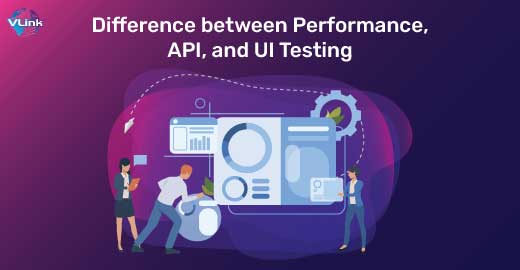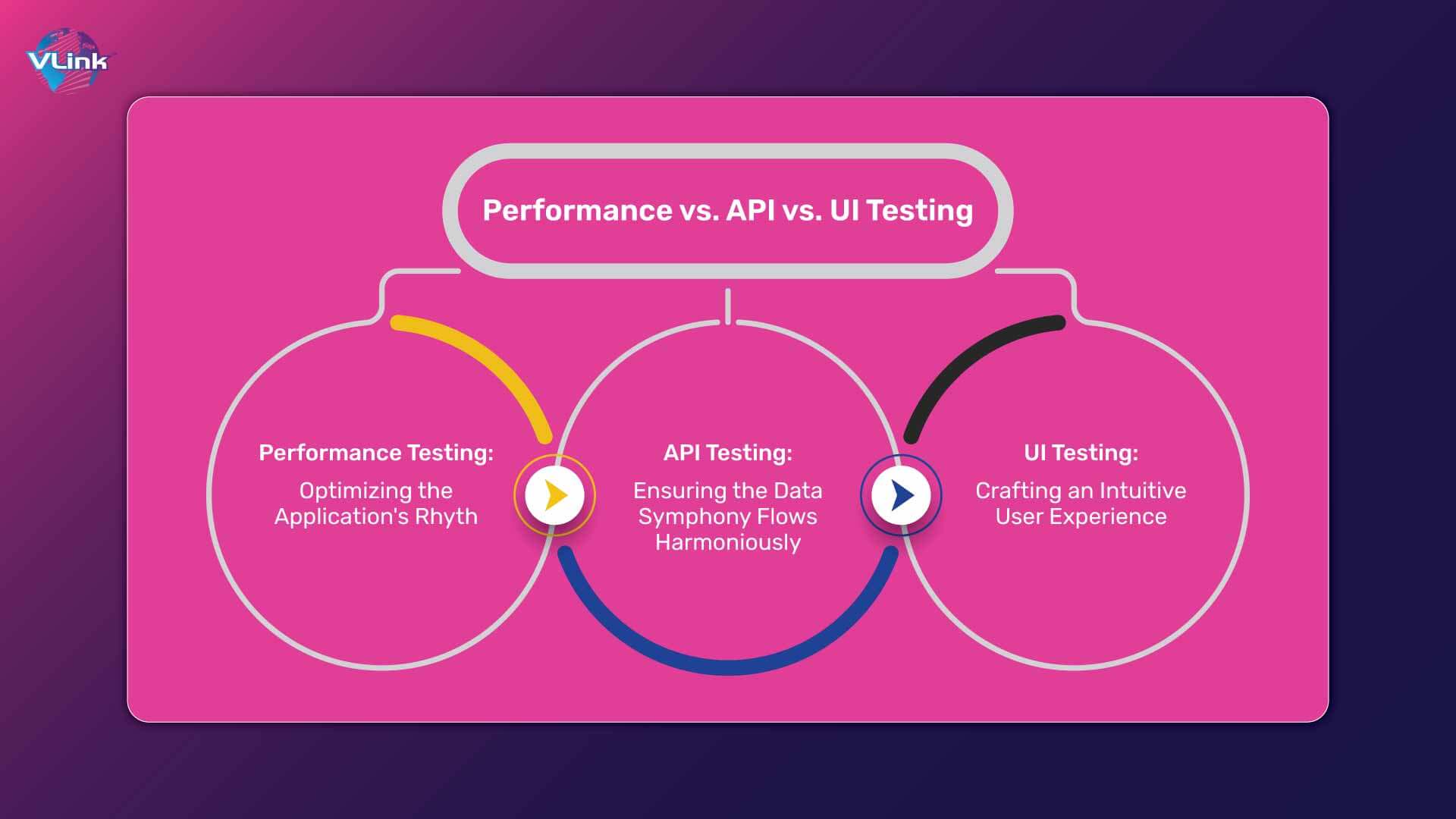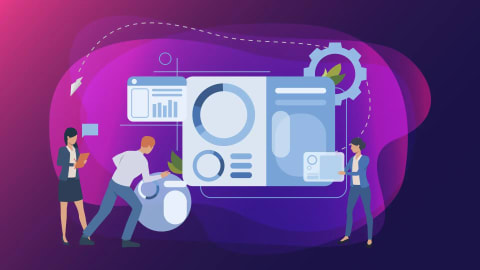Imagine a world where applications load instantly, data flows seamlessly, and user interfaces feel as intuitive as breathing. Achieving software perfection isn't just wishful thinking; it comes from carefully coordinated testing practices including performance, API, and UI testing. Each plays a distinct yet interconnected role in ensuring your software performs flawlessly, delights users, and stands the test of time.
Let's journey to understand these testing fundamentals and how they orchestrate a symphony of software excellence. Let’s start!
Understanding the Pillars: Performance vs. API vs. UI Testing

Performance Testing
The maestro of speed and efficiency. It simulates real-world usage scenarios with varying loads to assess an application's responsiveness, stability, and scalability. Imagine testing a concert hall under different audience sizes – you want it to handle intimate gatherings and sold-out shows flawlessly.
- Focus: How well the application performs under load.
- Tools Used: Load testing tools (JMeter, LoadRunner), monitoring tools.
- Automation Potential: High.
- Execution Time: This can be time-consuming due to complex setups.
- Expertise Required: Performance engineering skills.
- Primary Goal: Ensure the application meets performance requirements.
API Testing
The reliable messengers behind the scenes. APIs (Application Programming Interfaces) facilitate the seamless exchange of data between various components of an application. API testing ensures functionality, performance, and security, guaranteeing accurate data delivery, like ensuring smooth traffic flow on a well-maintained highway.
- Focus: Functionality, reliability, and security of APIs.
- Tools Used: API testing tools (Postman, SoapUI), scripting languages (Python).
- Automation Potential: High.
- Execution Time: Relatively faster.
- Expertise Required: API development and testing knowledge.
- Primary Goal: Ensure APIs function as expected and securely.
UI Testing
The stage where user experience takes center stage. UI testing focuses on the user interface's functionality, usability, and visual appeal. It's like testing the aesthetics of musical instruments – they should sound good and be comfortable and visually pleasing for musicians.
- Focus: Functionality, usability, and visual appearance of the user interface.
- Tools Used: UI testing tools (Selenium, Appium), visual testing tools.
- Automation Potential: Moderate.
- Execution Time: Relatively faster.
- Expertise Required: UI design and testing expertise.
- Primary Goal: Ensure users have a positive experience with the UI.
Read More: [Best Practices] Software Quality Assurance QA Testing Staffing Services for Enterprises In 2023
The Teamwork of Testing Types: How Different Tests Work Together
While each testing type has its distinct focus, they are not isolated acts. They work in concert to deliver a holistic view of an application's quality:
- Performance testing informs API and UI testing by identifying potential bottlenecks that could impact overall user experience, It's like recognizing which players in a team might struggle during a tough game.
- API testing lays the foundation for UI testing by ensuring the data exchanged between different application parts is accurate and reliable, forming the basis for seamless interaction between other user interface elements.
- UI testing provides valuable feedback to developers to refine the user interface and enhance its usability, ensuring every user feels comfortable and engaged, It's like adjusting the settings on a radio to get the best sound.

Diving Deeper: Difference of Each Testing Approach

Now, let's examine each testing approach in detail to find out their unique characteristics and execution methods:
Performance Testing: Optimizing the Application's Rhythm
- What it tests: Response times, load capacity, resource utilization, scalability under stress.
- How it's done: Tools like LoadRunner, JMeter, and K6 replicate the actions of multiple users accessing a website at the same time, similar to the surge of visitors trying to access a popular online shopping website during a flash sale.
- Benefits: Identifies performance bottlenecks, ensures smooth user experience under peak load, optimizes resource allocation, preventing laggy notes or dropped connections in your software's performance.
API Testing: Ensuring the Data Symphony Flows Harmoniously
- What it tests: Functionality, security, performance, reliability of APIs.
- How it's done: Tools like Postman, SoapUI, and REST Assured are utilized to send requests and verify responses from APIs, similar to ensuring that messages between different branches of a company are delivered correctly and understood without errors.
- Benefits: Guarantees data integrity and accuracy, improves application stability, enhances security posture, and safeguards your software from data corruption or security breaches.
UI Testing: Crafting an Intuitive User Experience
- What it tests: Functionality, usability, accessibility, and visual appeal of the user interface.
- How it's done: Manual testing with real users provides valuable insights into their interactions. In contrast, automated testing with tools like Selenium and Cypress ensures consistency across different devices and browsers, similar to how musicians rehearse individually and as a group.
- Benefits: Identifies usability issues, ensures intuitive user experience, improves user satisfaction and adoption, making your software a joy for everyone.
Read More: The Role of Automated Testing for Software Product Development

Why Choose VLink for Your Testing Services?
Having mastered the art of performance, API, and UI testing in harmony, choosing the right partner to conduct these vital tasks is crucial. Here's why VLink can be the ideal choice for your software's success:
- Expertise Across the Testing Spectrum: We have experienced QA experts with an in-depth understanding of all three testing types. Their combined knowledge ensures holistic evaluation and identification of potential issues across every aspect of your application.
- Tailored Testing Solutions: VLink believes in a variety of approaches. We work closely with you to understand your requirements and develop a customized testing strategy that aligns with your unique needs and budget.
- Automation Expertise: Leveraging industry-leading automation tools and frameworks, we optimize your testing process, saving you time and resources while ensuring consistent and reliable results.
- Continuous Integration and Delivery (CI/CD) Champions: We seamlessly integrate testing into your development process, enabling faster feedback loops and quicker time-to-market.
- Global Reach and Local Support: As a global IT services provider, we offer 24/7 support with dedicated teams in various locations, ensuring round-the-clock assistance and cultural sensitivity.
- Proven Track Record and Industry Recognition: With over 16 years of experience and numerous successful projects, we've earned the trust of diverse clients across various industries.
- Focus on Innovation and Continuous Improvement: We constantly invest in staying ahead of the curve with the latest testing methodologies and tools, ensuring your applications remain competitive and bug-free.
- Cost-Effectiveness and Flexible Engagement Models: We offer flexible engagement models, including fixed-cost projects, hourly rates, and dedicated team options, ensuring you get the best value for your investment.
By choosing VLink, you gain a reliable partner who will conduct your testing symphony with expertise, agility, and a commitment to your success. Let's create a software masterpiece, one well-executed test at a time.
Read More: Exploring the Different Types of Software Testing Services: A Comprehensive Guide
Conclusion: Building a Software Masterpiece with Testing
You can create a flawless software masterpiece that delights users by utilizing performance, API, and UI testing. Remember, each testing type plays a crucial role in this endeavor. Understanding their unique strengths and how they work together allows you to create high-quality, reliable, user-friendly applications that thrive in the ever-evolving digital landscape.
Hence, all tests, whether performance, API, or UI, are necessary for a software development environment. It's all about ensuring that each code/unit works correctly and that each module interacts smoothly without errors. VLink, a QA & testing service company, introduces testing services as per your software specifics and quickly develops easily maintainable test suites.







 Shivisha Patel
Shivisha Patel

















